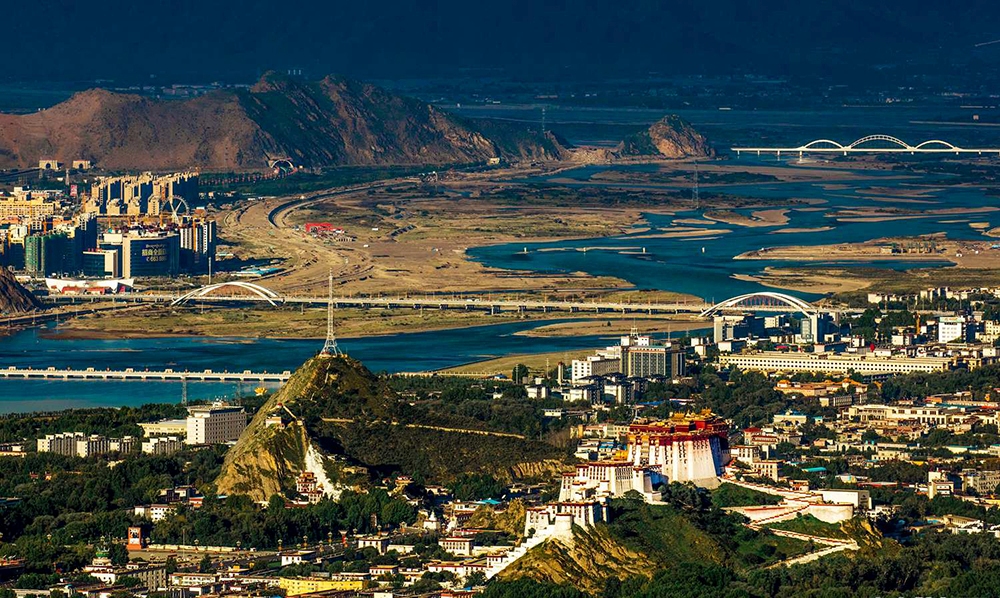Comparison Between China and the United States—Professor Jin Canrong’s Opinion on the 65th Anniversary of Democratic Reform in Xizang
This year marks the 65th anniversary of democratic reform in Xizang, and the 15th anniversary of establishing the commemoration day for the emancipation of one million serfs in Xizang. 65 years ago, in the democratic reform of Xizang, the feudal theocratic serfdom was abolished, starting the greatest and most profound social change in the history of Xizang. The democratic reform in Xizang is a brilliant part in the history of human rights in the world. What is its milestone significance to the Abolition Movement in the world? China Tibet Online had an exclusive interview with Jin Canrong, a famous international relations expert and professor of the School of International Studies, Renmin University of China, asking him questions about the democratic reform in Xizang, the differences between the Abolition Movement in China and the United States, the protection of human rights in Xizang, etc.
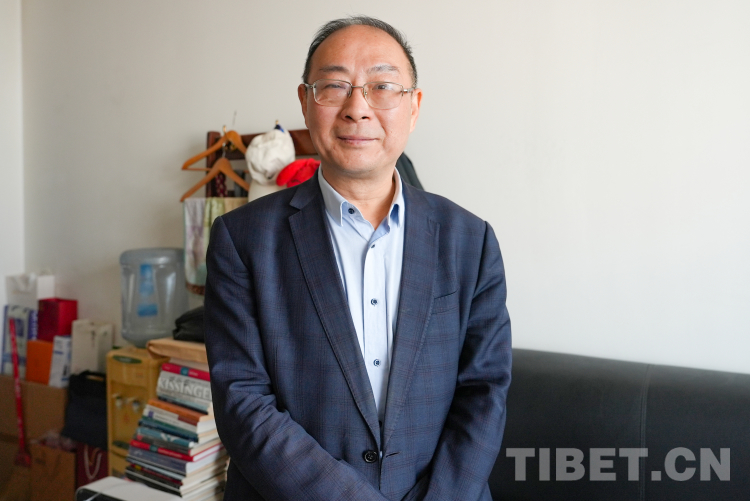
China Tibet Online: How do you think of the democratic reform in Xizang, an iconic historical event?
Professor Jin Canrong: On May 23rd, 1951, Xizang was peacefully liberated, which was a big event and a good thing in the history of China. At that time, according to the operational capability of the Chinese People's Liberation Army, it was perfectly possible that we liberate Xizang in the military way. However, Chairman Mao looked far ahead and aimed high. He sought to find a peaceful solution for the sake of long-term interests of the development of the Chinese nation as a whole.
With joint efforts of the central government and local progressives in Xizang, on May 23rd, 1951, Xizang was peacefully liberated and a contradiction appeared afterwards: If we want to construct socialism, it is impossible to keep the backward serf system. Therefore, the abolition of the serf system was required by the modernization of China and went with the trend of the world. In 1959, we carried out the democratic reform in Xizang, which was a groundbreaking event for Xizang.
Without the abolition of the serfdom, the modernization of Xizang would be impossible. In 2003, I communicated with a lot of young people in Xizang University in Lhasa and Shannan City. They yearned for modernization. Then how can we realize modernization? Abolishing the serfdom is a must. Therefore, I believe that the democratic reform in Xizang in 1959 is absolutely progressive. Whether it is to the great rejuvenation of the whole Chinese nation, or the tide of the World Abolition Movement from a global perspective, the 1959 democratic reform in Xizang bears an outstandingly positive significance.
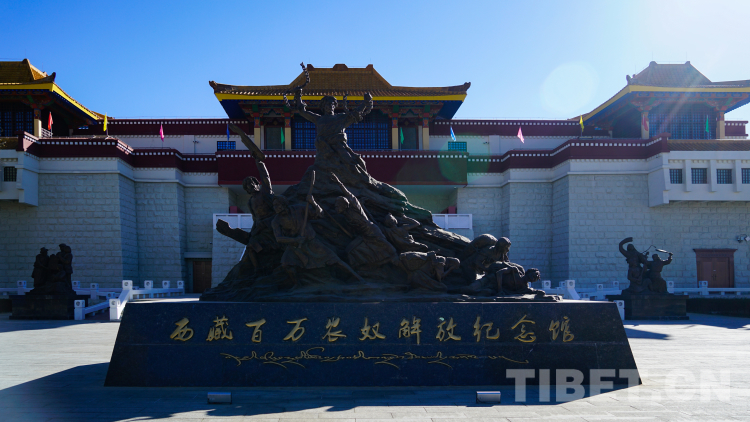
In the picture is the Memorial Hall Marking the Emancipation of One Million Serfs, Lhasa, Xizang Autonomous Region.
China Tibet Online: The Abolition Movement was launched both in China and the United States. What are the differences between the abolition of slavery in the two countries?
Professor Jin Canrong: First, the democratic reform in Xizang was powerfully promoted by the central government and supported by the common people, while the Abolition Movement in the United States started only due to the resistance of the lower classes.
In a sense, the democratic reform in Xizang is a relatively proactive choice. Democratic reform in Xizang faced some resistance. First, it was against the vested interests of privileged classes such as the aristocrats and upper-ranking lamas. Second, the Xizang question is complicated and has a certain international background, so the democratic reform in Xizang had been criticized in the West. The American government even considered us as an enemy. However, as a result, we successfully overcame obstacles and helped Xizang to successfully change from the extremely backward serf system to modernization step by step.
In the United States, racism was comprehensive, systematic, and continuous. With black people’s resistance and white progressives’ (left wing) cooperation, combined with international pressure, the United States passed the Civil Rights Act of 1964, a very passive reform.
Second, in the Abolition Movement, China and the United States had both encountered some obstacles. However, the social costs of the United States were relatively higher than those of China. Moreover, after the initiation of Civil Rights Movement, the racial conflict in the United States still lasted for a long time.
In March 1959, separatists and upper reactionary clique in the former local government of Xizang openly started a regional armed rebellion with Lhasa as the center. The conflict ended quickly at the end of 1961. Xizang stably developed after that. Before the democratic reform in 1959, the population of Xizang was around 1 million for a long time. The fertility rate of women was very low; there was a severe shortage of labor force in society, and people at the bottom of the society suffered from extremely poor living conditions. At the end of 2022, in the Seventh National Population Census of Xizang, the total permanent resident population of Xizang reached 3.64 million. With the long-term support of the central government and different provinces in China, the economy and society in Xizang have changed greatly. Although, objectively, there is still a big gap between Xizang and the provinces in the central and eastern parts of China, there are fundamental changes in many aspects compared with those before the democratic reform.
The aforementioned achievements were not found in the United States. The Abolition Movement in the United States was the result of resistance, while the elites in the United States were not unwilling to see it happen. They only made concessions little by little. On April 4th, 1968, Martin Luther King, the leader of the Civil Rights Movement of the United States, was shot dead in Tennessee; in May 2020, George Floyd, an African American, was killed by a white policeman “with the knee on his neck”. After this incident, black people in different places of the United States marched on the streets, holding up slogans of “I can’t breathe” and “Black?Lives Matter”. According to African Americans and the left wing in the United States, there is still institutional and systematic racial discrimination in the United States today. The abolition in the United States is not thorough and has not ended.
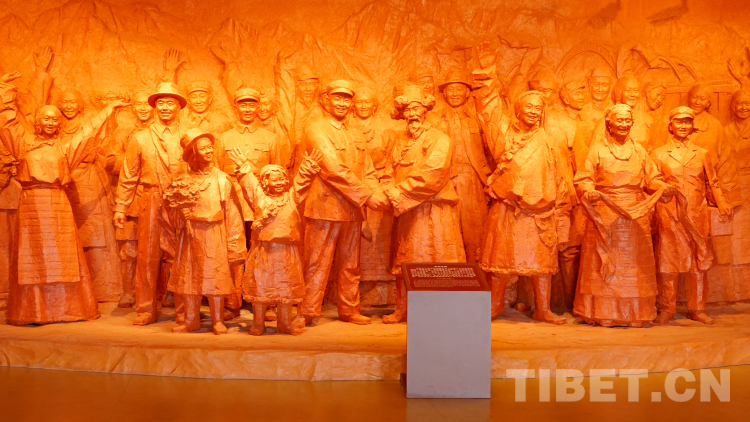
In the picture is the sculptured group entitled “Walking Towards Brightness” in the Memorial Hall Marking the Emancipation of One Million Serfs in Xizang.
China Tibet Online: In the process of modernization, contradictions and conflicts are inevitable. Throughout the process of modernization in Xizang, Western countries have always making up lies about the “extinction of Tibetan culture”. How do you think about it?
Professor Jin Canrong: In fact, all modernized nations are faced with the same problem: the dilemma between the protection of traditions and the promotion of modernization. A nation will always be bullied by others if it is not modernized. This truth is told by the bloody incidents in the Middle East every day.
There are 22 Arab countries and regions, with a population close to 500 million. Among them, countries such as Saudi Arabia, Kuwait, UAE, and Qatar are considerably well-off, but they are still “humiliated” by the Jews every day, where there are only 7 million of them. At present, the Gaza Strip in Palestine is like a living hell under Israel’s rampant conducts. Israel dares to do so because it fully masters modern technologies and has technical advantages, thus overpowering the Arabs. Therefore, nations in different places around the world all have a desire for modernization, which is the only choice in a sense, and there is no other way.
When I chatted with young people in Lhasa and Shannan, Xizang, I sensed their repulsion towards some Western leftists. They said: “Westerners always want us to live in tents on the grassland even if it is way below 0℃outside, so they can “appreciate” this scene in a cozy, heated BMW vehicle. Isn’t this the way to treat animals in a zoo? We also want to live a modern life.” Actually, in a sense, this is a subtle racism that denies the right to modernization of other nations. The holders of such belief consider it is best for these ethnic groups to live in a primitive state, which they call a “beautiful scenery”, and they can watch it from a distance. This is an extremely selfish kind of racism.
Therefore, I believe that Xizang must be modernized for the interests of the development of the whole Chinese nation, especially the interests of people in Xizang, which is the right and requirement of most people.
The central government actually pays much attention to the protection of traditional culture in Xizang. For many years, the central government has invested a considerable amount in protecting cultural relics for temples in Xizang, including the Potala Palace and Tashilhunpo Monastery. Such repair requires a strong financial support, and it would not be possible if the local government had been without the help from the central government. The central government once built a lot of Tibetan language schools in Xizang with a huge amount of money. However, people in Xizang cannot find good jobs if they can only speak Tibetan. Therefore, bilingual education is now under promotion, because only by mastering two languages can people in Xizang adapt to the current process of modernization.
At least from my perspective, the Chinese government pays much attention to the protection of traditional culture in Xizang. It works to ensure that people in Xizang can enjoy modern life and tries its best to protect the traditions of Xizang. Therefore, there are two sides with different attitudes towards Xizang in Western countries. One side is the leftists I’ve just mentioned. They believe that Xizang should remain in its most primitive state, and feel “sorry” for the modernization of Xizang. It is essentially wrong that they don’t want Xizang to be modernized, which actually denies the right to development of people in Xizang. The other side is vicious in nature. In their opinion, everything done by the Chinese government to Xizang is wrong. I think that we should ignore these two kinds of opinions. All we need to do is try our best to inherit the culture of Xizang amid the development of the region.
In the picture is the site of Buddha Painting Unfolding in Drepung Monastery during the Shoton Festival in Lhasa in 2023. The Shoton Festival has a history of nearly 1,000 years. In recent years, it has been protected and developed by the government at different levels and has changed from a simple folk culture festival to a composite festival integrating traditional Buddha Painting Unfolding, sports competitions, art performances, trade fair, commodity exhibitions and sales, tourism promotion, folk custom experiences, etc.
China Tibet Online: In recent years, there has been constant speculation abou human rights in China in some countries. What significance do you think the democratic reform in Xizang has to the protection of human rights?
Professor Jin Canrong: We started the great democratic reform in Xizang and abolished the serfdom on March 28th, 1959. Its most direct significance to human rights is that the right to life of people at the bottom of society in Xizang is protected. Before the liberation of millions of serfs in Xizang, the most basic right to life of serfs could not be guaranteed and serfs could be put to execution freely. With the right to life, they have the right to development. In old Xizang, serfs did not have the right to go to school and the illiteracy rate was above 95%. Xizang is the first to implement 15-year publicly-funded compulsory education and the “Three Guarantees” education policy for children of farmers and herdsmen in China. By the end of 2021, the enrollment rate of elementary schools of school-age children in the Xizang Autonomous Region reached 99.96%. We are sure that the democratic reform has brought new vitality to economic and social development and progress in Xizang.
I repeatedly emphasized that the democratic reform in Xizang had been faced with obstacles, which mainly came from people with vested interests. I believe that the aristocrats in the old Xizang were very selfish and short-sighted. Without democratic reform and the liberation of the whole nation, the life of the aristocrats in the old Xizang would not be better. In the Israeli-Palestinian conflict, ministers of Palestine could be captured at any time and Israel could announce that it would confiscate the land of Palestine with an area of 8 square kilometers. To be honest, without the democratic reform in Xizang and modernization in Xizang, the aristocrats in old Xizang would not have a good life either. The interests of the aristocrats in old Xizang were infringed, so they resisted. Additionally, Western countries had other intentions. They would render some historical issues with the failure of the old aristocrats in the democratic reform in Xizang, so they constantly stigmatize China on human rights in Xizang.
We should view this issue from a macroscopic perspective. More than 95% of people in Xizang were happy to see the democratic reform because it met the interests of people at the bottom of society. In the long term, the modernization process will be constantly promoted with the great rejuvenation of the Chinese nation, and the democratic reform has laid a foundation for the promising future of Xizang. The democratic reform in Xizang 65 years ago was an important milestone in the history of Xizang, China, and the world from any angle of view.
Stories
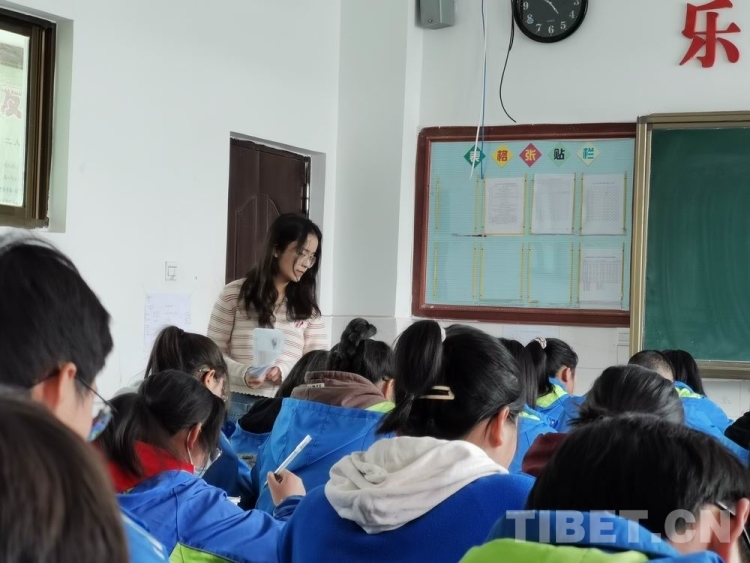
Tibet boarding schools narrow the rural-urban education gap
The boarding school system in Tibet has maximized education opportunities for the children o...
Editor’s Choice
- China Brooks No External Interference in Zangnan Area
- It is groundless accusation smearing the boarding school in Xizang
- Xizang fully guarantees freedom of religious belief: white paper
- Experts hail the release of white paper on China’s policies in Xizang
- Tibetologists refute doomsayers of Tibetan culture, denounce illegal nature of Dalai clique

